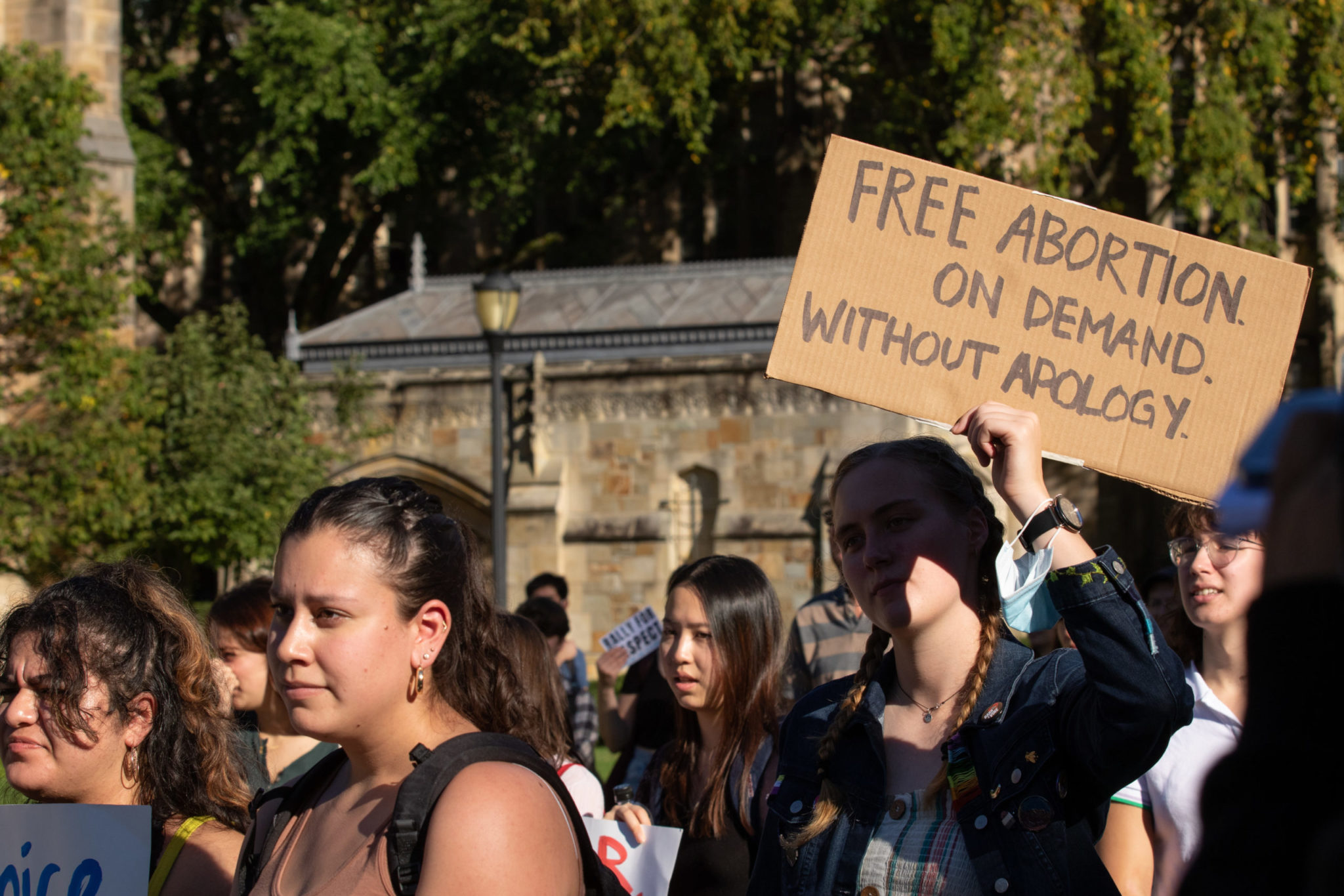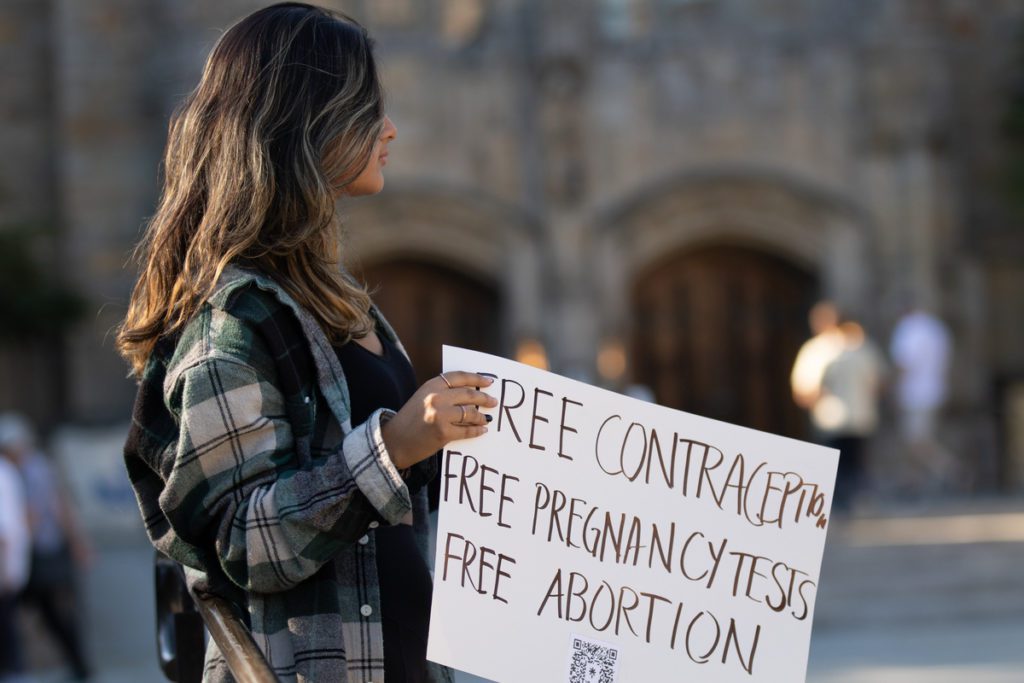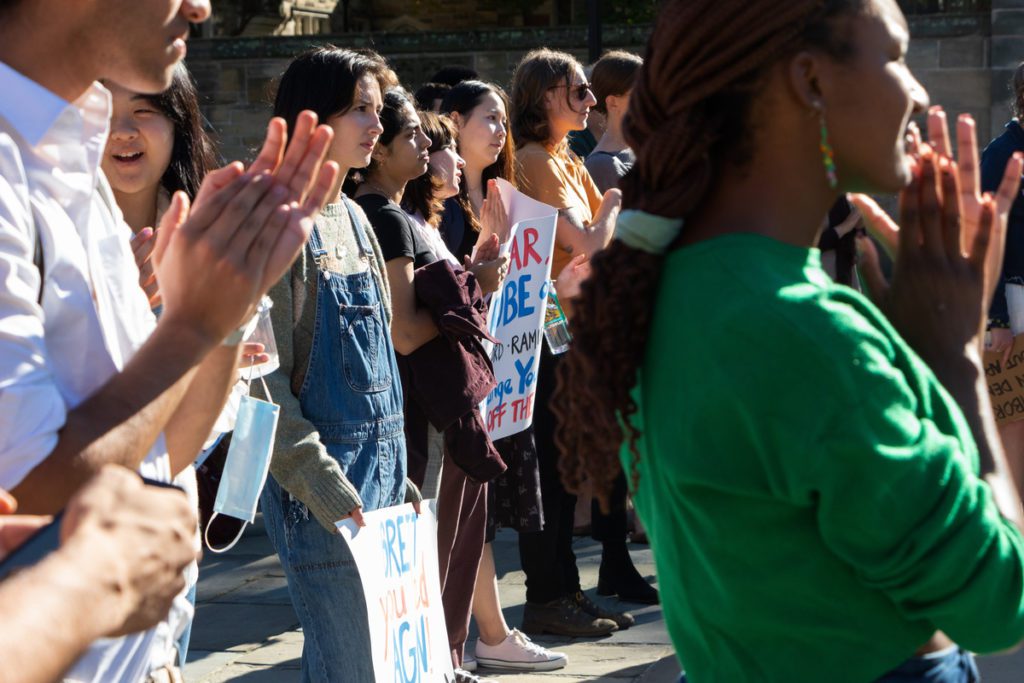On Kavanaugh anniversary, Yalies demand expanded reproductive and trans care
Students at Yale gathered on Cross Campus to protest healthcare options and the University’s ties to Supreme Court justices who voted to overturn Roe v. Wade.

Zoe Berg, Senior Photographer
More than 200 students rallied on Cross Campus on Thursday to demand that Yale provide expanded reproductive and transgender healthcare.
The protest was staged against the backdrop of a nationwide debate over abortion access and on the four-year anniversary on the confirmation of Brett Kavanaugh ’87 LAW ’90 to the United States Supreme Court. Students at 50 universities across the country also participated in a national day of action organized by the Young Democratic Socialists of America and Graduate Students Action Network.
Advocacy groups at Yale are calling on the University to provide contraceptives, pregnancy tests, abortion care and hormone therapy to all students free of cost.
“This is not just a protest,” Caitlyn Clark ’23, co-chair of Yale’s YDSA chapter said. “This is the beginning of a campaign, a struggle between us and the University, between us and the politicians who claim to care about abortion rights but do nothing to codify abortion rights into law or provide easier access to reproductive health.”

Yale, protest organizers said, is uniquely responsible for reproductive rights advocacy because three of the justices who voted to overturn Roe v. Wade — Kavanaugh, Clarence Thomas LAW ’74 and Samuel Alito LAW ’75 — are University alumni.
The protesters’ list of demands calls on Yale to break its institutional silence on reproductive rights by both expanding healthcare access on campus and directing funds towards reproductive and trans rights advocacy groups.
“The president has received emails from students regarding this matter,” University Spokesperson Karen Peart wrote in an email to the News. “But he has not received a link to the petition, However, he has reached out to the interested students to ask for the link.”
Renewed advocacy around reproductive justice was first sparked in May when a draft of the Supreme Court’s Dobbs decision was leaked, indicating the likely curtailing of abortion access. Another protest was staged during alumni reunions in June by classmates who graduated with Kavanaugh from Yale College in 1987.
Organizers also read aloud statements from several alumni who knew Kavanaugh personally while at Yale, including Carrie Baker ’87.
“What the hell are we doing here?” the statement from Baker read. “How are we producing people who are taking away our long-standing constitutional rights?”

While the national abortion debate has historically been framed around cisgender women’s rights to reproductive care, Yale organizers link the causes of reproductive and transgender rights together.
“There is no way to truly achieve reproductive justice without trans justice,” said Anika Seth ’25, who co-organized the protest and is also a staff reporter for the News.
Advocates nationwide say that transgender individuals face heightened challenges accessing abortion care due to discrimination and inconsistent medical knowledge about gender transitions. These challenges are particularly prevalent for people of color and low-income individuals.
Organizers urged students to sign their petition and contact members of the Yale administration to indicate their support for the demands listed in an opinion piece published by the News.

The demands include increased access to reproductive and transgender healthcare access at Yale, specifically forms of birth control and hormone replacement therapy.
Peart told the News that contraception and pregnancy termination will always be covered under Yale Health Basic. Students under the basic plan receive free contraception through external pharmacies under the Affordable Care Act. Peart confirmed, however, that only students under Yale Speciality Care are eligible for coverage for “gender transition services.”
Clarke said that some students are not able to opt into Yale Specialty Care because of its $3,000 price tag.
Protester Flora Ranis ’24 called the University’s current state of healthcare options “absolutely reprehensible.”
“We have billions of dollars in our endowment,” Ranis said at the protest. “It is feasible for us to decrease healthcare costs and provide reproductive health care and basic human rights to our students.”

Protesters look to other universities that have taken recent action on abortion access. The state of California recently required its higher education system to expand reproductive healthcare options.
Students who rallied at Barnard College on Thursday announced that Barnard had agreed to their list of demands and would provide abortion pills to all students starting in 2023.
Organizers at Yale also demand that the University cover the costs of hormone replacement therapy, guarantee a maximum wait time of four months and switch to an implied consent model of care, in which prospective patients do not need a letter from a therapist to begin transitional therapy.
Dobbs v. Jackson Women’s Health Organization was decided in June 2022.







